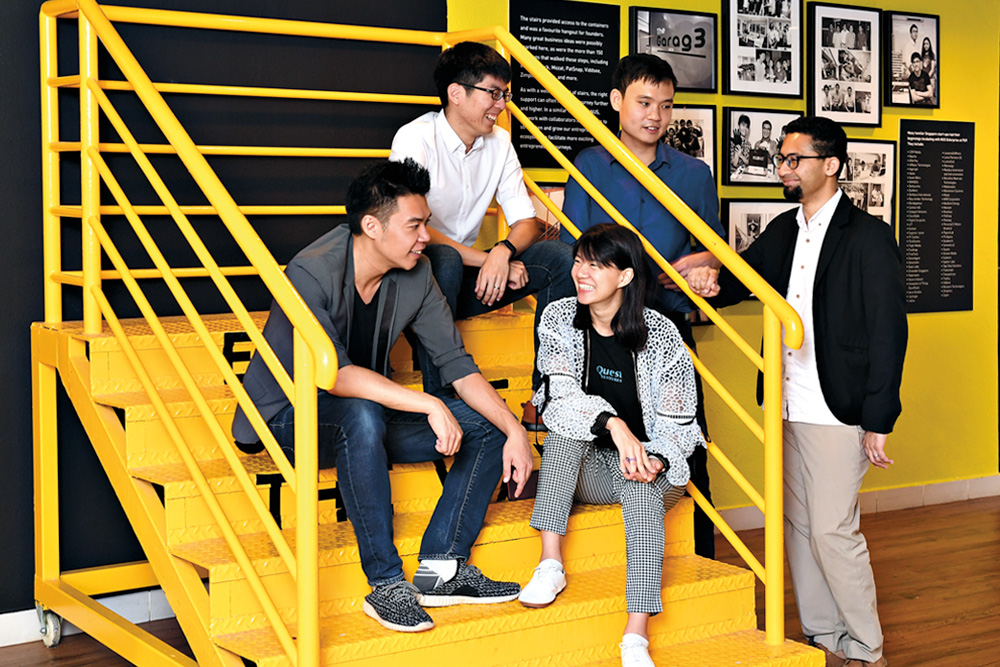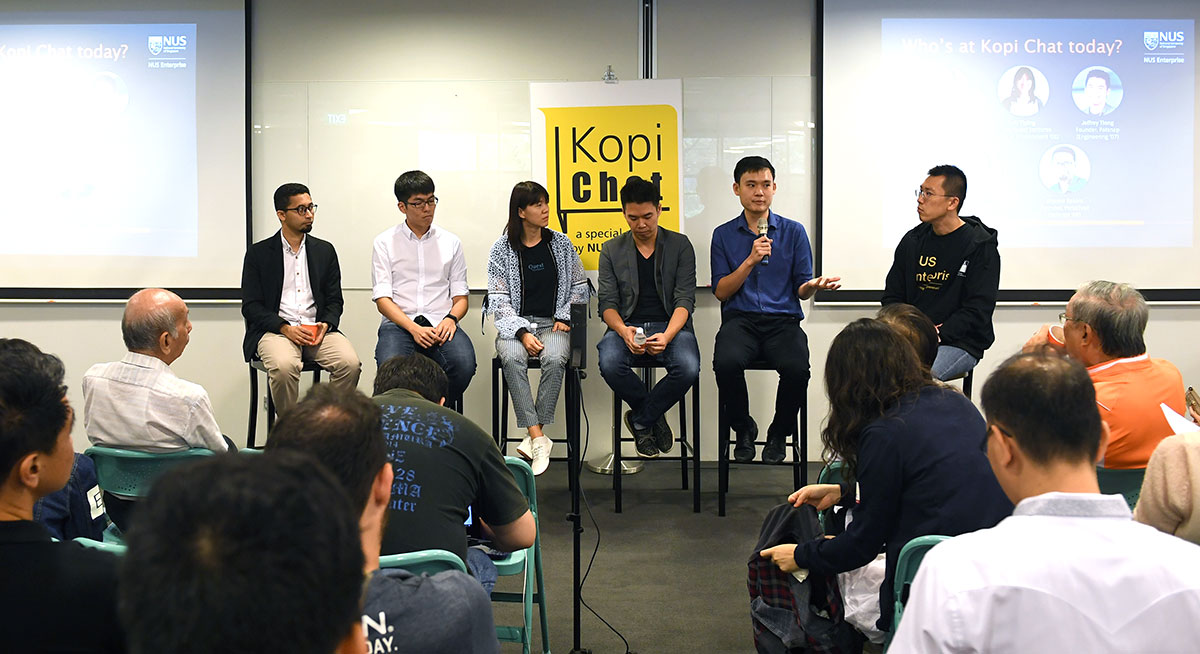Entrepreneurship: Nature or Nurture?
NUS alumni entrepreneurs share their personal motivations, tribulations and insights on navigating the start-up ecosystem.
Talking Shop
Given the realities of the new economy — with its emphasis on innovation and non-traditional business models — the entrepreneurial spirit matters more than ever. NUS for its part has been successful in nurturing this through initiatives such as NUS Enterprise and the Graduate Research Innovation Programme (GRIP). But the question remains: Are enterpreneurs born or made? Alumni who have ventured down this path come together to discuss this, as well as the appeal and challenges of being in the start-up world.
OUR PANEL

Mr Jeffrey Tiong
(Engineering ’07)
35, Founder, Patsnap

Ms Goh Yiping
(Design and Environment ’05)
37, Partner, Quest Ventures

Mr Amos Heng
(Engineering ’19)
24, Co-founder, FathomX

Mr Ng Zhen Ning
(Engineering ’15)
29, Co-founder & CEO, NUSpace

Mr Shamir Rahim
(Science ’08)
37, Founder, Versafleet
What are key qualities entrepreneurs should ideally possess?
Goh Yiping: Resilience, grit and connections. My first two start-ups didn’t work out, but I just kept coming back even though I was beaten to the ground. The ability to connect with all sorts of people is also integral. Raising money requires the right connections. Admittedly, coming from a well-connected background does have an impact, but I say to the underdogs: if you can’t beat them, join them. Be thick-skinned and find yourself in their crowd.
Jeffrey Tiong: Curiosity and an open growth mindset. For example, I wasn’t good at public speaking, but I challenged myself to grow. I also have people from 13 different nationalities in my company, so knowing how to work with all of them requires adaptability.
Amos Heng: Speaking as someone who is more junior, I would say resourcefulness is one of the most important qualities. In the start-up world, having a good idea alone doesn’t mean that things are going to happen. For example, an investor might seem very keen but might eventually decide not to invest. It is easy to feel like you are entitled to this, that and the other, but you require a resourcefulness to know where to get what you need when things fall through. Also, pick your battles. Motivational videos will tell you to keep pursuing your particular goal. But there is no shame in saying that something is not your fight.
Ng Zhen Ning: The key thing is to be positive. Conveying what I want to achieve can be challenging — when I say that I am in the space tech business, people think I am offering coworking spaces! The questions that others ask can make you very demoralised. But always think of what you want to do next and don’t give up.
Shamir Rahim: One thing often not talked about is that the role of the founder changes as the company grows. You might be a product manager at the start, and then an engineer; and when you restructure with growth, the way you do things has to change. It is not a ‘one-trick pirate ship captain’ thing, because one day the sole pirate ship needs to turn into a naval force.
In your opinion, then, are entrepreneurs made or born?
Amos: I’d say that entrepreneurship is nurtured, because anyone who knows me would say that I am not the “start-up type”. Yet here I am, a co-founder of my own company. NOC (NUS Overseas Colleges) started me on this journey, and I came to see that doing my own thing is the best way for me to be part of the med tech scene.
Jeffrey: When I was young, the expected path for graduates was to become an engineer, doctor, lawyer or accountant. Going to the US through NOC opened my eyes. That said, all skillsets can be learnt, but you cannot train a drive or a hunger to achieve something.
Yiping: It’s really not as binary as whether it is nature or nurture. It is both. I am probably born to want to be an entrepreneur — having helped out at my parents’ hawker stall since I was eight, and growing on a farm set up by my grandmother, whom I look up to. I have that raw drive to succeed but I kind of never knew what to do, or where to even start. Through the NOC programme, we saw a different degree of polish when it comes to entrepreneurship. It also offered us great courses for training with the greatest minds. Being forced to come up with ideas within a short time frame also sharpened us and showed what we are made of.
Zhen Ning: Similarly, my dad started his own tech business back when I was seven or eight and I looked up to him. I would even follow him to his client meetings. You could say that I was born to lead an entrepreneur’s path, but I wouldn’t have followed him if I wasn’t inherently interested.
Shamir: To use a scientific analogy: a bacterial system might randomly have a gene for antibiotic resistance, but you need the right conditions for the gene to express itself. I liken this to entrepreneurship: you need the right conditions to bring out what might be within you — and NOC did that for me.
What was the biggest challenge in your entrepreneurship journey, and how did you overcome it?
I realised that it is really about finding funding — and doing so much earlier than you need it, because no VC will want to rescue a start-up.Ms Goh Yiping
Shamir: One of the biggest challenges during our first five years was the change of staff. For example, you start the company with your first few team members who follow you for years and believe in your vision. Their departure can be painful, and you also develop a survivor’s guilt. But you just have to wrap your head around it, wish them well and prop them up if need be.
Zhen Ning: It took a year just to get our first investor. Finding the right mentor who has been in the right industry can help to unlock doors for you.
Yiping: Back in 2010, we were trying to stay true to fundamentals of doing a proper, profitable business. But then the market was flooded with big players with deep pockets, and who operated on different models that a small start-up simply wouldn’t have had the scale to execute. Soon it became a war of capital, of who is more well-funded. There I was thinking about how to make it with a margin from what I sell, when Qoo10’s business model actually has it making a loss with every item they sell! I realised that it is really about finding funding — and doing so much earlier than you need it, because no venture capitalist (VC) will want to rescue a start-up. Start the conversations early and be confident for VCs to track you early. VCs also hope to see start-ups expanding regionally faster, and that makes start-ups that are better-placed to do so more attractive as an investment. The adaptability of the founder is a challenge too. I often question my abilities, skills and relevance, and one can have an extended downtime where one just feels like he or she is not good enough. Having fellow founders to cry on and hang out with, and who can show you the ropes, keep my sanity as a founder. Maintaining good mental health is a huge thing.
Jeffrey: This is my 12
th year [of running my own business] and there has definitely been a lot of ‘extended downtime’! In 2013, I tried to raise our series A funding and we were in the meeting with an angel investor. He banged the table and said that I was not fit to be a CEO as I did not know how to speak in a way that instils confidence. Over the years I have evolved and developed my own authentic style. How to keep evolving — especially in relation to how to work with a growing team — is my challenge.
Amos: Am I really fit to be sitting here [on this panel], or am I just filling the space? Dealing with the ‘impostor syndrome’ is a challenge. I am in an industry not traditionally dominated by young people, and am generally surrounded by people who are much older than I am. I overcame that by leveraging upon mentors who can offer their expertise, and tell me the dos and don’ts, which is vital.
Yiping: You will feel like an impostor as long as you are pushing yourself out of the norm and trying to achieve more, and surrounding yourself with people who are better than you. But you can only learn new things by exposing yourself to uncertainties. Even now, I still feel this way. This is normal, and you just need to know the mechanisms to deal with that. For me, I strive to be the best that I can be, and let the rest take care of itself.

Do you think entrepreneurs by choice have the same kind of drive as those who do it out of necessity?
Shamir: The ‘educated entrepreneur’ is a recent phenomenon. In our parents’ time, you started a business if you couldn’t find a job. But we live in a time of abundance, and many entrepreneurs are doing it by choice. That doesn’t make them any less driven. Those who are propelled by necessity might be hungry for success, but they might also be a bit raw and make knee-jerk decisions. Those who start companies by choice might have the benefit of clarity of thought to make better long-term decisions – so it kind of balances off.
Amos: For the younger generation, I would say that we can be just as driven – not to put the next meal on the table, but to make an impact.
Jeffrey: Even in China, you see that the millennial entrepreneurs born after the 1990s – who are of better means than their parents – are still very driven, though not by hunger but by passion. And in China, they use different terms for entrepreneurs of different levels: a businessman (商人) who works solely for a profit, a start-up founder (创业家) who has a personal mission; and an entrepreneur (企业家) who has a social mission.
Yiping: We are seeing a very different breed of entrepreneur: folks who have a lot more means and are very passionate about their cause.
Jeffrey: You will see more variety from the younger generation of entrepreneurs.
Entrepreneurship is seen as a national agenda — what more do you feel can be done to grow the start-up sector?
We live in a time of abundance, and many entrepreneurs are doing it by choice. That doesn’t make them any less driven. Mr Shamir Rahim
Shamir: There are quite a lot of barriers to getting a government contracts, especially when a lot of the sectors are state-invested. My first big contract was from a German MNC, followed by a Swiss MNC – I am still waiting for my Singapore contract!
Jeffrey: The government gives out a lot of grants, but what start-ups need are contracts. You see that a lot in other countries: in China, they are always supporting their own products.
Amos: When I went to Shanghai on the NOC programme, I observed that the government institutions are very open to trying out new systems. It is easy to look at a start-up and say: you are so small, what can you do? But start-ups are such that the more contracts you get, the more you will grow. For example, Singapore’s HOPE Technik has grown so much since their contract to produce the Red Rhino for the Singapore Civil Defence Force (SCDF).
Yiping: Nothing beats a contract. It is not about spoon-feeding, but just giving opportunities to our own. Internationally, Singapore companies are gaining recognition and winning lots of competitions. But somehow we don’t see that same level of confidence in us on home ground. In this aspect, the government needs to take the lead. We are a small enough country with not enough users, so if the government can take the lead to ‘support local’, that is a huge boost of confidence. For example, when you say that the Singapore government is using your software, the Indonesians will take note.
What would be your advice for aspiring entrepreneurs?
Zhen Ning: If you have no idea how to start, go take a start-up course. Don’t go in and try to trouble-shoot as you go along.
Shamir: Entrepreneurship might seem like the flavour of the moment, but it isn’t for everybody. You might feel a social pressure to start something, or put on your resume that you founded this, that and other. I am a very pragmatic guy, I have my study loans to settle, my parents’ expectations to manage. So, I started only five years after graduation. If your moment comes earlier, such as when you are an undergraduate — great. But it is never too late to start your own business when you find your passion.

If you’d like to join our Forum panel, do write to us at OARconnect@nus.edu.sg to express your interest and pick from our list of future discussion topics that you may want to be part of.

This issue’s Forum topic was debated at a special installment of Kopi Chat, held on 31 August at The Hangar, and co-organised by NUS Enterprise and Alumni Relations.
Text by Koh Yuen Lin. Photos by Lionel Lai.